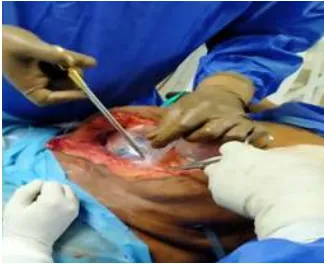Abdominal burst & hernia complications in 56-year-old female managed.
Nov 05 2022 |
Medicover Hospitals |
A 56-year-old female patient presented to ER with spontaneous abdominal burst and high-grade fever. History says she had severe abdominal discomfort for one month and treated at a private hospital in Vijayawada. She was diagnosed with urinary tract Infection and uremic encephalopathy. She stayed for 12 days and was managed conservatively.
After reaching home, she had an episode of vomiting. Later, she noticed evisceration of bowel loops through previous surgical scar. She was rushed to nearby well-known hospitals at Vijayawada and Eluru. Was denied treatment due to a ssoc i a ted multiple co -morbid conditions and
Covid Positivity: She had a history of congenital heart disease and underwent open heart surgery for valve repair in 2010. Since then, she was on Acitrom tablet. She also had a history of two caesarean sections and operated for incisional hernia one year back.
On arrival: She was dehydrated and dis-oriented, Bp 100/60 mmHg, PR-130/minute, SPo2- 94% with room air, Resp. rate-30/mt. Temp-100*C
On examination, it was observed that she had eviscerated bowel loops in her lap with severe oedema, congestion and discolouration. Further evaluation was done and high-risk outcomes were explained to the patient. She was shifted to emergency operation theatre for surgery.
Intra-OP findings: Showed oedematous bowels outside the abdomen with a loop formation. The following picture shows gangrenous intestine with colour change. Hence, it was resected and double barrel Ileostomy was performed as a First stage surgery.
Remaining intestines were placed inside the abdomen and a polystyrene cover was used as a layer to prevent protrusion of intestines.
She was shifted to ward and treated for covid. After her recovery from Covid, second stage operation was performed and colostomy was created. She was shown to a cardiologist for cardiac related issues. Now, she was stable.
After close observation for 2 months, final stage surgery was performed to close the colostomy and abdomen. Presently she is doing one at her home.
Discussion
All abdominal surgeries carry 33% risk of a post-operative incisional hernia. An incisional hernia occurs at or in close proximity to a surgical incision through which intestine protrudes. It results from weakening of the abdominal muscle due to surgical incision. The precipitating factors are individuals who participate in excessive or premature physical activity after surgery, gain excessive weight, continuous activity that results in raised abdominal pressure. Usually occurs within 3-6 months post-surgery but can happen at any time. Treatment modalities include herniorrhaphy and laparoscopic repair. In serious cases, like that of present patient, resection of gangrenous part, colostomy or end to end anastomosis are performed based on the complexity of the illness.
Contributors
Consultant Nuclear Medicine
News Letter
Medicover Hospitals Impact Newsletter November 2022



